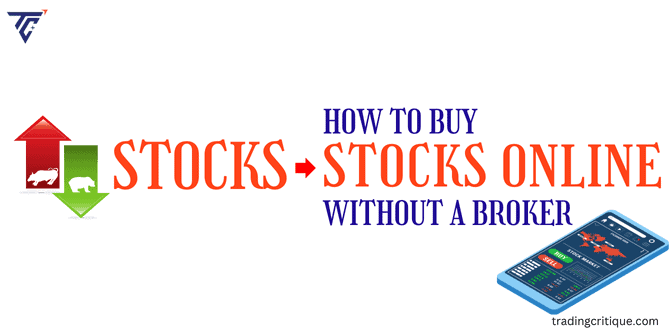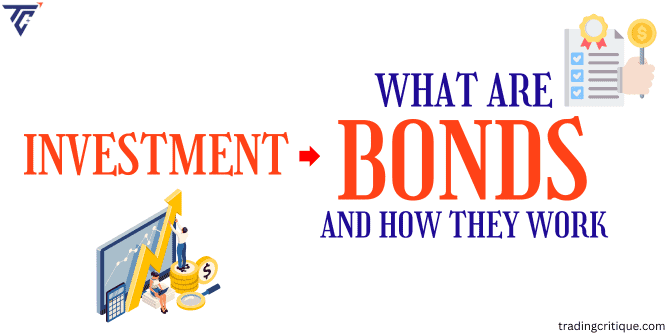4 Ways to Buy Stock without a Broker
Can you invest in the stock market without a broker? If you have any doubts about that, the quick answer is yes. In this article, we will find out what they are and how to buy them.
Quick Insights
You can buy shares without a broker using the Direct Stock Purchase Plan (DSPP) and Dividend Reinvestment Schemes (DRIPS) which allow individuals to buy shares from partner companies.
If you can buy shares yourself from certain companies using a dividend reinvestment scheme it will automatically reinvest the dividends paid by the companies.
Another option for buy stocks online without a traditional broker is an online brokerage account. The process of opening it is similar to that of a personal savings account.
How to purchase shares without a broker?
How to buy stocks without a broker? Stock trading can be done without a broker to buy stocks, but self-directed trading using a broker-dealer platform can help avoid fees and participate in the stock market without relying on a personal broker.
Determine the type of trading account
Choose an investment account with online brokerage platforms for tools and resources to start stock trading. Set up your account and transfer money from your bank account to start your trading journey.
Research the companies you want to buy shares
When selecting stocks to buy, do research and read through relevant information, such as recent shareholder letters and news updates. For individuals without professional economic knowledge, this procedure could seem daunting, but help is available in the shape of tools.
Choose a stock based on your budget
To invest in multiple companies, allocate your budget accordingly. Some online brokers allow buying fractional shares, especially for high-priced companies.
Once your budget is established, choose a stock using stock screeners to identify patterns and make trades based on the stock’s expected performance. Key sources of information include market trends, company data, and other relevant information.
Purchase your stock
Using an online brokerage, track your investment performance on a single platform, receive communication from companies, and choose between markets and limit orders when ready to make your purchase.
Market orders indicate readiness to buying and selling stocks at current prices, but prices can change quickly. Limit orders fill at a certain point, expiring after a time, but not guaranteeing execution price.
What are the ways to invest without a broker?
Stock market investment is a future income platform. Moreover, investing without a broker is a way to reduce your investment costs such as account opening and brokerage fees. There are six main ways to invest in the stock market without a stockbroker.

Direct stock purchase plan (DSPP)
DSPPs were created as a way to allow investors to buy shares directly from the company. A transfer agent or third-party administrator will help process the investment. While some businesses opt to function as their transfer agent, the majority work with a third party.
Large, reputable companies usually offer DSPPs to buy and sell stocks. You can choose to have more shares automatically deducted from your savings or checking account each month.
Setting up a DSPP requires very little money. While some DSPPs are free of charge, most have minimal costs. These schemes offer long-term investors an easy and automatic option to acquire shares gradually.
Dividend reinvestment plan (DRIP)
A dividend reinvestment plan is a useful tool for passively growing your investments. With this type of account, you buy shares directly from the companies. The key feature is that any dividend income you receive is automatically reinvested to buy more shares of that company.
Registering for DRIP is typically straightforward and has minimal fees. After you enroll, everything is handled automatically, so there’s no need to monitor things yourself.
This reinvestment of dividends can be an effective strategy for investors who intend to hold stocks long-term in a particular company. The compounding effect of reinvesting dividends allows you to steadily accumulate more shares and increase your stake over time through a hands-off approach.
Online brokerage account
An online brokerage account offers a straightforward setup, similar to opening a bank account, allowing users to buy and sell stocks from a single source. A brokerage firm provides the opportunity for investors to invest in various financial instruments such as stocks, bonds, mutual funds, and exchange-traded funds (ETFs).
With many firms eliminating commissions, users can access a variety of investing resources without paying. Accessing a trading app allows convenient tracking of stock purchases on the go.
A brokerage account serves as a way for investors to access investment products in the markets where they otherwise would not be able to invest directly. Open an account on the company’s website by providing your personal information, such as name, address, email, and social security, to ensure easy access and transactions.
Direct market access (DMA)
One option for individual investors seeking to directly trade stocks on stock exchanges is the use of Direct Access Trading Platforms. These platforms provide DMA to retail investors and can be researched to find one that suits your investment objectives.
After selecting a platform, sign up and furnish the necessary personal and financial data. You can then deposit funds into your account, and utilize the trading tools provided by the platform to directly buy and sell shares on the stock exchange.
Employee stock purchase plan
Many publicly traded companies offer their employees the opportunity to purchasing stocks at a discount through an Employee Stock Purchase Plan or ESPP. Check with your employer to see if they have such a program.
If they do, you can sign up and choose how much money to set aside from each paycheck to buy shares of company stock. The ESPP will accumulate your contributions and use them to buy shares at the discounted price available to employees.
Over the long-term, contributing to an ESPP is a great way to become a part owner of your company at lower than market prices.
Examine Investing Apps
Investment applications on mobile devices have become widely used and easy-to-use methods for trading stocks independently. They typically provide simple, uncomplicated designs and reasonable pricing. Choose a trusted investment app that allows you to buy shares directly.
Create an account by finishing any required authentication procedures. Add money to your account balance. Explore and buy ownership stakes in your choice of corporations straight through the application.
Conclusion
Now you will realize that you can invest in the stock market without a broker. Investing without a broker can be a bit challenging for you. Although it requires many risk tolerance, it offers many advantages to the investor such as no brokerage account opening fee, no commission fee, and own decision-making.
Beginners face challenges in investing in stocks on their own, but deciding on a suitable investment approach, account type and investment amount is very important. Invest by fully understanding all of the above investment strategies. This will greatly benefit your investment.
Learn more: 8 Best Ways to Minimize Risk in Stocks Investing
Pro Tip
Continue to learn and improve your financial decisions using our trusted forex broker website. If you are a beginner or someone who is looking to broaden your knowledge in investment instruments such as stocks, bonds, mutual funds, and cryptocurrencies, be sure to visit our site.
FAQs – Frequently Asked Questions
1. Can I trade stock without a broker?
Yes, you can buy or sell stocks on your own by creating an online brokerage account at one of the many brokerage firms.
Direct stock purchase plans (DSPs) and dividend reinvestment plans are two ways that publicly listed firms allow you to acquire shares directly. The transaction is handled by the company’s transfer agent rather than a broker.
2. Do you need a stock broker to buy stocks?
- The quick answer is no. It is not mandatory to have a traditional broker who advises and charges fees.
- However, you do require a brokerage firm - the online platform where you can buy and sell stocks, bonds, exchange-traded funds (ETFs), and other investments.
- Even if you refuse to work with a broker, you must work with a brokerage firm.
3. What is a broker vs. brokerage?
A brokerage offers middleman services for a variety of transactions, such as real estate purchases, loans, and investment advice. To facilitate a transaction, a broker acts as a middleman between a buyer and a seller.
4. What are the differences between DSPP and DRIP?
- Investors can buy stock in publicly traded companies through DSPPs, even if they do not currently own any shares.
- Companies themselves often provide DRIPs, which give shareholders the choice to use the cash dividends they earn to automatically purchase more stock.
- Whereas DSPPs furnish a means for new investors to become shareholders in the first place, DRIPs allow existing shareholders to expand their holdings.
5. What is the role of a transfer agent?
A third person acting on behalf of the corporation is called a transfer agent. The transfer agent handles investor account balances, conducts share transactions, issues cancellation certificates, and resolves any issues related to missing or stolen certificates.
6. How do I know if a company has a direct stock plan?
- If you want to determine if a company offers a direct stock purchase program, check the investor relations section of their website.
- This section usually contains details about the methods and mechanisms by which you can invest.
- You can also explore a site like Computershare using their filter to search for businesses that offer direct share purchase programs.

Subscribe to
Our Newsletter
Latest Posts
How to Trade Forex | Learn 6 Strategies and Tips
Discover the world of forex trading with our comprehensive guide. Learn essential...
Read MoreFP Markets Review 2024: Everything You Need To Know
Founded in 2005, FP Markets is a leading online broker renowned for...
Read MoreHow to Invest in Ethereum in 2024 – Simple Guide for Beginners
Ethereum is a decentralized blockchain platform that enables smart contracts, enabling secure,...
Read MoreIs Cryptocurrency a Safe Investment? What You Need To Know
Investing in cryptocurrency involves selecting the right cryptocurrency and securely storing your...
Read MoreHow to Read Forex Charts for Beginners • Simple Methods
Traders look for the currency pair price movements, their patterns, and their...
Read MoreBonds: What it is, Types of Bonds & How they Work (2024 guide)
Are you seeking for safe investment with predictable returns? Our 2024 guide...
Read MoreWhat are The Best Crypto Trading Strategies for Beginners in 2024?
Unsure about choosing the best trading strategies for beginners in 2024? This...
Read MoreForex Pairs: How They Work, How To Read, Examples
Forex pairs are combinations of two different currencies that are traded in...
Read MoreBest Ways to Avoid Losses in Forex Trading
Foreign Exchange – Forex market is the world’s largest financial market in...
Read More









